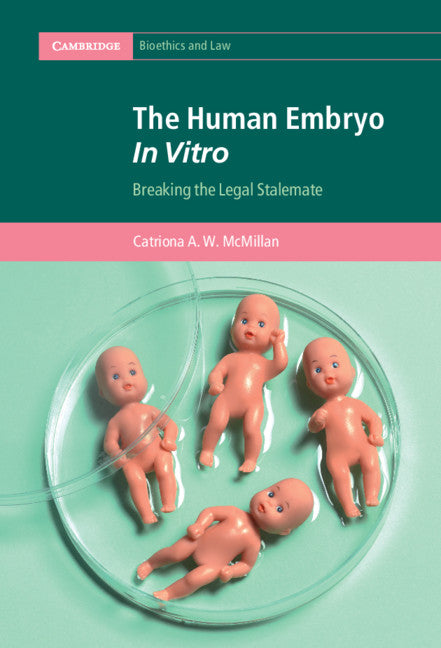Freshly Printed - allow 8 days lead
Couldn't load pickup availability
The Human Embryo In Vitro
Breaking the Legal Stalemate
Proposes that the human embryo in vitro is in a unique 'legal stasis' between potential person and useful research artefact.
Catriona A. W. McMillan (Author)
9781108844109, Cambridge University Press
Hardback, published 1 April 2021
224 pages
16 x 23.5 x 2 cm, 0.5 kg
'Using two innovative lenses - liminality and the gothic - in this book McMillan addresses the place and construction of 'the embryo' in law. Her penetrating socio-legal analysis draws on the science and technology studies and anthropological literatures to persuasively argue that there is no singular 'embryo' in law, but instead multiple (unacknowledged) ones. Her incisive analysis emphasises the significance of thresholds, boundaries, and processes for understanding law and legal gaps regarding these. She insists that it is 'time to break the legal stalemate surrounding embryos in vitro'. The book is a call to arms - for both regulators and legal scholars - to take context and process seriously. Readers will be left in no doubt that this is a call we should all heed.' Muireann Quigley, Professor of Law, Medicine, and Technology, Birmingham Law School
The Human Embryo in vitro explores the ways in which UK law engages with embryonic processes under the Human Fertilisation and Embryology Act 1990 (as amended), the intellectual basis of which has not been reconsidered for almost thirty years. McMillan argues that in regulating 'the embryo' – that is, a processual liminal entity in itself - the law is regulating for uncertainty. This book offers a fuller understanding of how complex biological processes of development and growth can be better aligned with a legal framework that purports to pay respect to the embryo while also allowing its destruction. To do so it employs an anthropological concept, liminality, which is itself concerned with revealing the dynamics of process. The implications of this for contemporary regulation of artificial reproduction are fully explored, and recommendations are offered for international regimes on how they can better align biological reality with social policy and law.
Introduction
Part I. Into Liminality: 1. The evolution of 'the embryo' in law: a matter of process?
2. 'The embryo' in law today: the human fertilisation and embryology act 1990 and beyond
3. From process to purgatory: moving beyond legal stasis
Part II. Through Liminality: 4. Navigating legal purgatory: the otherness of embryos
5. A liminal lens
Part III. Out of liminality: 6. A context based approach
7. Looking forward: the 14-day rule, in vitro gametogenesis, and ectogenesis
Conclusion
Bibliography.
Subject Areas: Medical anthropology [PSXM], Forensic medicine [MMQ], Embryology [MFKC3], Medical sociology [MBS], Medical ethics & professional conduct [MBDC], Medical & healthcare law [LNTM]


